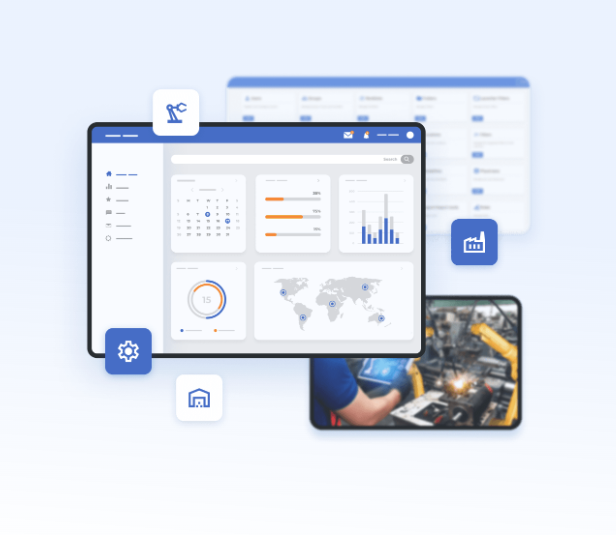Introduction
The integration of Artificial Intelligence (AI) into manufacturing software has transformed the industry, making production lines more efficient, reducing costs, and improving product quality. AI-powered solutions are now a fundamental component of Manufacturing Software Development, enabling companies to streamline operations, enhance predictive maintenance, and optimize supply chain management. This article explores the impact of AI on modern manufacturing software, its key applications, and the future of AI-driven manufacturing solutions.
AI in Manufacturing: An Overview
Artificial Intelligence in manufacturing involves using machine learning, computer vision, and advanced data analytics to automate and optimize production processes. AI-powered systems can analyze vast amounts of data, detect patterns, and make real-time decisions, leading to improved efficiency and reduced downtime.
Some of the core AI technologies driving transformation in manufacturing include:
-
Machine Learning (ML): Enables software to predict equipment failures, optimize production schedules, and enhance quality control.
-
Computer Vision: Used in automated inspection systems to detect defects and anomalies in products.
-
Robotics & Automation: AI-driven robots improve precision, efficiency, and safety in production lines.
-
Natural Language Processing (NLP): Facilitates human-machine interaction and enhances decision-making through AI-driven chatbots and virtual assistants.
Key Applications of AI in Manufacturing Software
1. Predictive Maintenance
One of the most significant benefits of AI in manufacturing is predictive maintenance. AI-powered manufacturing software analyzes data from sensors and IoT devices to predict potential equipment failures before they occur. This approach helps manufacturers reduce downtime, extend machinery lifespan, and minimize maintenance costs.
Example: AI-driven predictive maintenance in automotive manufacturing helps identify wear and tear in robotic arms, preventing sudden failures and reducing costly repairs.
2. Quality Control & Defect Detection
AI-powered manufacturing software enhances quality control by using computer vision and deep learning algorithms to detect product defects with high precision. Automated inspection systems can analyze images or sensor data in real time, ensuring that defective products are identified and removed from the production line.
Example: AI-driven visual inspection systems in semiconductor manufacturing help detect microscopic defects that human inspectors might miss, improving overall product reliability.
3. Supply Chain Optimization
AI plays a critical role in optimizing supply chain management by predicting demand, managing inventory, and improving logistics. Machine learning algorithms analyze historical data and market trends to optimize procurement and distribution processes.
Example: AI-driven supply chain software in electronics manufacturing can predict component shortages, allowing companies to adjust their sourcing strategies and avoid production delays.
4. Smart Production Planning
AI-powered Manufacturing Software Development incorporates intelligent production planning tools that help manufacturers optimize resource allocation, reduce waste, and improve efficiency. AI models analyze production schedules, demand forecasts, and real-time data to make dynamic adjustments to workflows.
Example: AI-powered production scheduling software in the textile industry helps adjust machine settings based on material availability, reducing waste and improving production efficiency.
5. Human-Robot Collaboration
AI-driven cobots (collaborative robots) are designed to work alongside human workers, enhancing productivity and safety. These robots use AI algorithms to adapt to dynamic work environments, perform repetitive tasks, and assist workers in complex assembly operations.
Example: AI-powered cobots in aerospace manufacturing assist technicians with precision assembly tasks, improving efficiency while reducing physical strain on workers.
6. Energy Efficiency & Sustainability
AI-driven manufacturing software also contributes to energy efficiency and sustainability by optimizing energy consumption, reducing waste, and implementing smart energy management systems.
Example: AI-powered energy management systems in food processing plants analyze real-time energy usage and adjust machine operations to minimize power consumption without affecting production quality.
The Future of AI in Manufacturing Software
Advancements in AI-Driven Automation
AI-driven automation will continue to evolve, leading to fully autonomous production facilities where AI systems manage end-to-end manufacturing processes with minimal human intervention.
Integration with Industry 4.0
The integration of AI with Industry 4.0 technologies such as the Internet of Things (IoT), digital twins, and blockchain will further enhance manufacturing efficiency, security, and transparency.
Personalized & Adaptive Manufacturing
Future AI-driven Manufacturing Software Development will enable personalized and adaptive manufacturing, where production lines adjust dynamically to meet changing customer demands and preferences.
Ethical AI & Workforce Transformation
As AI adoption increases, manufacturers must address ethical concerns, data privacy issues, and workforce transformation by upskilling employees and implementing responsible AI policies.
Conclusion
AI has revolutionized modern manufacturing software, driving efficiency, quality, and innovation across the industry. From predictive maintenance and quality control to supply chain optimization and energy efficiency, AI-powered solutions are shaping the future of manufacturing. As Manufacturing Software Development continues to evolve, businesses that embrace AI-driven solutions will gain a competitive edge in the global market. Investing in AI-powered manufacturing software is no longer an option but a necessity for companies aiming to stay ahead in the rapidly advancing industrial landscape.
